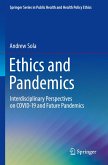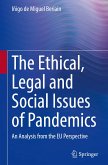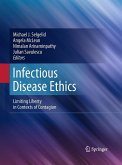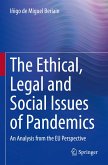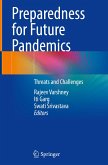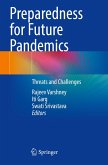This book is for readers who wish to understand the ethical implications of the COVID-19 pandemic - holistically - on communities, politics, the economy, the environment, international relations, public health, and, most importantly, on their own lives and their own futures. It also helps readers to think through the wide-ranging ethical implications of the new age of global pandemics.
The COVID-19 pandemic has transformed all of our lives to such an extent that no single publication will ever be able to capture its complexity. The book acknowledges this complexity by embracing interdisciplinary dialogue. It is open to diverse points of view, different ethical systems, and a wide variety of academic disciplines. It suggests three broad avenues to exploring the subject:
Ethics for Pandemics: What ethical theories are useful for pandemic living?Ethics in Pandemics: How are long-standing ethical dilemmas revealed in pandemics? Ethics of Pandemics: How should politicians and public health professionals create ethical systems of pandemic management?
Interdisciplinary perspectives are another key feature of the book and reflect the important insights that many academic disciplines - medical ethics and public health, history, political science, economics, behavioral and evolutionary psychology, and climate science - bring to bear on the subject.
In the chapters, the author joins theory and practice, providing an overview of the major ethical theories:
Kant and DeontologyUtilitarianism and Consequentialist EthicsSocial Contract TheoryEgoism and AltruismVirtue Ethics
It then uses these theories to analyze both COVID-19 and also historical pandemics, including typhus, smallpox, the Black Death, HIV/AIDS, and polio.
Ethics and Pandemics: Interdisciplinary Perspectives on COVID-19 and Future Pandemics prepares readers to better understand ethical living during times of crisis. While written for students pursuing any discipline, it is particularly suited for those seeking degrees in public health, health care, political science, and philosophy. Furthermore, non-specialized readers and members of the general public will find the book of interest.
The COVID-19 pandemic has transformed all of our lives to such an extent that no single publication will ever be able to capture its complexity. The book acknowledges this complexity by embracing interdisciplinary dialogue. It is open to diverse points of view, different ethical systems, and a wide variety of academic disciplines. It suggests three broad avenues to exploring the subject:
Ethics for Pandemics: What ethical theories are useful for pandemic living?Ethics in Pandemics: How are long-standing ethical dilemmas revealed in pandemics? Ethics of Pandemics: How should politicians and public health professionals create ethical systems of pandemic management?
Interdisciplinary perspectives are another key feature of the book and reflect the important insights that many academic disciplines - medical ethics and public health, history, political science, economics, behavioral and evolutionary psychology, and climate science - bring to bear on the subject.
In the chapters, the author joins theory and practice, providing an overview of the major ethical theories:
Kant and DeontologyUtilitarianism and Consequentialist EthicsSocial Contract TheoryEgoism and AltruismVirtue Ethics
It then uses these theories to analyze both COVID-19 and also historical pandemics, including typhus, smallpox, the Black Death, HIV/AIDS, and polio.
Ethics and Pandemics: Interdisciplinary Perspectives on COVID-19 and Future Pandemics prepares readers to better understand ethical living during times of crisis. While written for students pursuing any discipline, it is particularly suited for those seeking degrees in public health, health care, political science, and philosophy. Furthermore, non-specialized readers and members of the general public will find the book of interest.


